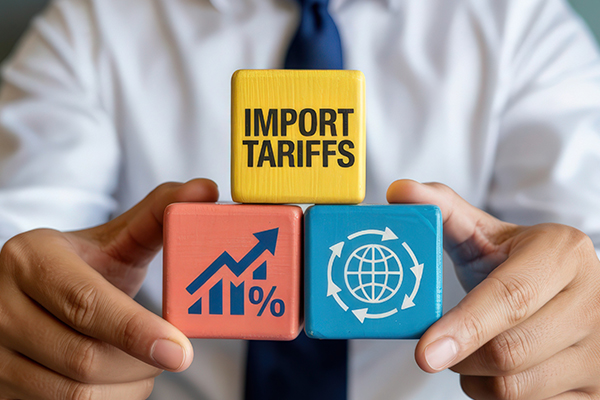Company Credibility Check: How to Verify Business Legitimacy
10-Feb-26
Global trade has come a long way, and the international marketplace has shrunk. Today, the world has access to goods and services from across the globe. Many products are imported and exported to meet domestic demands, lower costs, or address limited availability.
However, crossing a country’s boundaries follows certain protocols and incurs costs. This brings us to the concept of tariffs.
A tariff is a tax (customs duty) imposed by one country on goods imported from another country. Governments use tariffs to raise revenue, protect domestic industries, and at times as leverage in trade or foreign policy negotiations.

Tariffs have a long-standing history and have played their unique role, both favourable and otherwise. In recent times, global trade has been affected due to wars, supply-chain disruptions such as the Red Sea and Panama Canal constraints, political conflicts, and upheavals in foreign trade policies. The impact of these factors trickles down to end consumers, who are often taken aback by inflationary pressures.
Although countries levying tariffs may see advantages, they can create challenges for customers. Higher tariffs can reduce the availability of imported goods or push up product costs. In many sectors, governments apply tariff escalation, keeping duties lower on high tariffs, which weigh heavily on imported raw materials and higher on semi processed or finished goods, reshaping costs along the value chain.
Micro, Small, and Medium Enterprises (MSMEs), which are mainly associated with manufacturing and service provision, face the brunt of tariff changes. MSMEs often rely on specific imported inputs for their end products. Every financial deviation can affect customer loyalty and final product costs.
A sudden increase in tariffs, triggered by political scenarios, global supply chain disruptions, regulatory changes, or inflation, has a domino effect on MSMEs, their consumers, and stakeholders. With limited buffers, MSMEs frequently need to pass on a substantial share of these costs to end customers. Such sudden changes can shake up the very foundation of business between organisations and customers – predictability, reliability, and trust.
As product costs increase, customers are faced with a dilemma that forces them to look beyond their brand preference and loyalty. Often, end customers are unaware of the underlying causes of price hikes linked to tariffs. What customers are concerned about is what suits their budgets. They may switch to cheaper products or alternatives as a result of such hikes.
This creates a risk for MSMEs, for whom customer loyalty and goodwill play a significant role. The trade-off between tariffs vs trust is a delicate balance.
When affordability is compromised, brand loyalty takes a backseat. Customer trust gained over the years can wear off when they feel the pinch in their pockets.
While MSMEs and businesses have no say in global trade decisions or tariff hikes, they can mitigate the risks of losing customer goodwill and trust by revisiting a basic tenet of relationships - transparent communication. Transparency also builds trust.
Educating customers about the various causes of price changes, such as increased tariffs, raw material costs, or compliance costs, ensures transparency. Aware customers are more likely to empathise and trust the brand. They also have the scope to make more informed decisions. More often than not, such transparency safeguards customer loyalty.
With the variety of products and services available to customers, it is an established fact that quality, service, and value always override price in the long run.
Customers can be won over by offering high-value products and services, whether the value is created through a unique or robust value proposition, outstanding customer service and engagement, or just fair and ethical business practices.
Many larger brands that offer highly priced products and services already use this basic rule to attract, engage, and retain their customers. Not surprisingly, brands with a strong value proposition have a competitive advantage and are highly sought after by both existing and prospective customers.
Such trust and loyalty are built by the brand over the years, progressively and consistently.
Customer engagement, feedback, and loyalty programs can be effortlessly implemented by using technology. Digital platforms can help track the impact of tariffs on customer loyalty and customer buying patterns. Data analysis and intelligence can help MSMEs anticipate, mitigate, and plan interventions to engage with their customers.
Digital tools can help MSMEs invest in customers regularly and effectively. These tools can also help businesses track which of their programs, engagement initiatives and interventions are working to their advantage.
Advanced digital tools like CRMs, Data Analytics, Business Intelligence, and Artificial Intelligence, etc., can offer crisp and timely insights into consumer behaviours and trends. Many of these tools also help in consistent communication with customers to engage with them.
As someone wisely said, “A satisfied customer is the best business strategy of all.”
Amid economic disruptions, political upheavals, or financial inflation, tariff hikes may be unavoidable. However, ensuring customer trust is not. For MSMEs, the challenge lies not just in the tariff vs trust debate. It also lies in managing costs while nurturing relationships with its customers.
A business can manage the financial discrepancy by realigning its business strategy, reviewing its supply chain, and possibly using innovation to reduce production or overhead costs.
However, in the battle between tariffs vs trust, the strategy is quite simple. At the core of building customer trust and loyalty, the business must resort to elementary aspects such as transparency, value, and empathy.
The impact of tariffs on customer loyalty may be witnessed. However, by being transparent and setting clear goals and using the right tools, businesses can set up to maintain a strong communication line and foster the relationship.
Dun & Bradstreet, the leading global provider of B2B data, insights and AI-driven platforms, helps organizations around the world grow and thrive. Dun & Bradstreet’s Data Cloud, which comprises of 455M+ records, fuels solutions and delivers insights that empower customers to grow revenue, increase margins, build stronger relationships, and help stay compliant – even in changing times.

Create a faster path from prospect to profitable relationship with D&B Hoovers. Get comprehensive USA & UK company information.